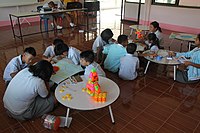
Photo from wikipedia
AIM To explore trainee and qualified advanced practitioner learning experiences, how training has prepared learners for clinical practice and role transition. Evaluation of a multidisciplinary learning approach was sought, identifying… Click to show full abstract
AIM To explore trainee and qualified advanced practitioner learning experiences, how training has prepared learners for clinical practice and role transition. Evaluation of a multidisciplinary learning approach was sought, identifying its impact on developing collaborative learning and working partnerships. DESIGN AND METHODS A small-scale, mixed-methods cross-sectional study was used to gather descriptive data. Convenience sampling was used with two groups: trainees and qualified advanced (paediatric) nurse practitioners/advanced clinical practitioners (ANPs/ACPs). All participants had completed or were undertaking master's level training. An anonymous, voluntary online survey was used to gather quantitative and qualitative data reflecting participant learning experiences. Evaluation research methodologies and their application were examined through exploration of three advanced practice frameworks and a well-established framework for evaluation of training. FINDINGS Overall, responses indicate positive learning experiences, and that current and previous ANP/ACP training in the UK does adequately prepare trainees for practice. However, further improvements in curriculum content are suggested. Consistent with the literature, collaborative multidisciplinary teaching, learning and mentorship were identified as key elements in the learning process and role transition.
Journal Title: British journal of nursing
Year Published: 2022
Link to full text (if available)
Share on Social Media: Sign Up to like & get
recommendations!